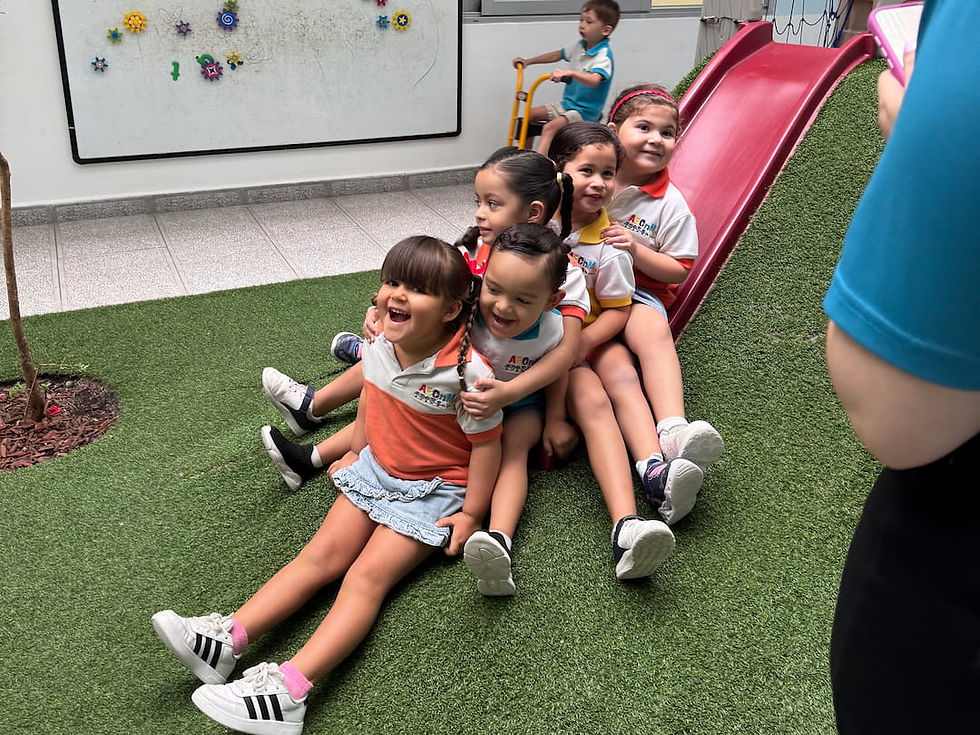What You Should Know Before Choosing a Preschool in Panama
- Marianela de Sousa
- Aug 28, 2025
- 3 min read
A guide to help you determine if a preschool in Panama is safe, trustworthy, and right for your child’s development
Choosing a preschool—or CAIPI, as they are officially known in Panama—is a key decision during your child’s early years. It's not just about finding a place where someone will look after your child while you work, but about ensuring their physical, emotional, and cognitive development is in the right hands.
Every family has its own priorities, but there are certain essential elements you should never overlook. Here's what you need to know before making your decision.

What is a CAIPI?
CAIPI stands for Centro de Atención Integral a la Primera Infancia (Center for Comprehensive Early Childhood Care). These are preschools —whether private or public— that are supervised and certified by the Ministry of Social Development (MIDES) in Panama.
Their purpose is to ensure that children aged 0 to 4 receive quality care and age-appropriate stimulation in a safe environment, with trained staff and a curriculum that supports holistic development. In Panama, MIDES recognizes and certifies as CAIPI those centers that meet the standards for providing comprehensive care to children under 4 years old.
What does a certified CAIPI include?
A preschool in Panama with CAIPI certification must meet the following requirements:
Hold a valid operating license from the MIDES.
Have safe, spacious, and age-appropriate environments.
Comply with safety regulations (fire extinguishers, emergency exits, visible access points).
Employ qualified teaching staff, and in many cases, psychologists or social workers.
Include kitchen, cleaning, or maintenance staff if food is provided.
If a center you visit is not certified by MIDES, it’s a good idea to ask why.
Where can a preschool operate in Panama?
In Panama, preschools may operate in homes, commercial spaces, or shopping centers. However, not all spaces are appropriate.
According to MIDES guidelines, CAIPIs should be:
Located in safe zones, far from risks like gas stations, workshops, laundromats, or restaurants with gas tanks.
Preferably on the ground floor.
With visible access points and clear evacuation routes in case of emergency.
These guidelines are designed to minimize risks and ensure children’s safety.
What should a good preschool have?
Beyond the educational approach, there are some non-negotiables:
Spacious, ventilated, and safe environments, suited to each stage of development.
Bathrooms sized and equipped for small children.
A structured curriculum, adapted to children’s abilities and interests.
Professionals trained in early childhood development, with experience in small group settings.
Support staff, including kitchen and cleaning personnel if meals are offered.
Psychologists or social workers, when needed, to assist with adaptation and follow-up.
A preschool isn’t just a place to “entertain” children. It’s where foundational emotional, social, and cognitive skills are developed through routines, play, affection, and support.
What questions should you ask when visiting a preschool in Panama?
It’s not only okay to ask questions—it’s essential. Here are some suggestions:
Are you certified by MIDES as a CAIPI?
What is the staff’s professional background?
What does the daily routine look like?
What happens if a child gets sick?
What curriculum and materials do you use?
How is safety handled at drop-off and pick-up times?
How do you support children who struggle to adjust?
You can also ask about the surroundings. If you notice a laundromat next door or a restaurant with gas tanks, take that into account.
What else should you observe?
In addition to what you’re told, pay attention to how you feel in the space:
How do teachers speak to the children?
Does the staff seem trustworthy and warm?
Do the children appear relaxed and happy?
Is the facility clean?
Is the environment calm and respectful?
Do they explain their methodology clearly?
Do you feel at ease while you're there?
You can request references from other families or visit more than once. Sometimes, small details say more than a checklist. And don’t forget—your intuition matters too.
Want to learn more about preschools in Panama?
To dive deeper into the official requirements and standards that govern early childhood centers in Panama, here is a helpful resource:
CAIPI Information – MIDES Panama (Note: unfortunately this source is only offered in Spanish, but an online translator can help you with the text)
This official resource can help you make informed and safe decisions for your child’s well-being.
In Summary
Choosing a preschool is one of the first big decisions you'll make as a parent. You don’t need to have all the answers at once—but you do need information, observation, and a little intuition. Every family is different, but some things shouldn’t be negotiable: safety, qualified staff, legal certification, and a loving environment. Your child deserves a place to grow up safe, happy, and well cared for.






Comments